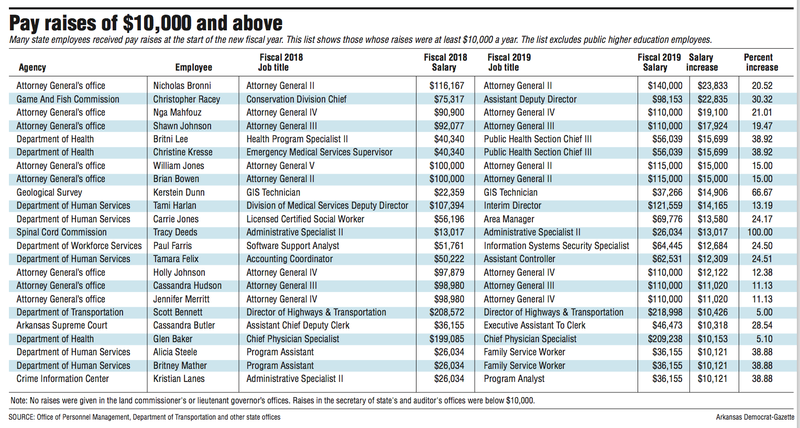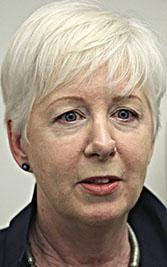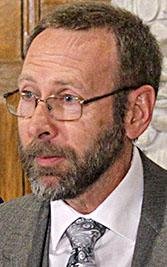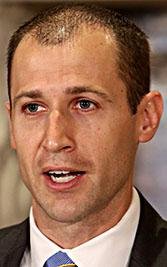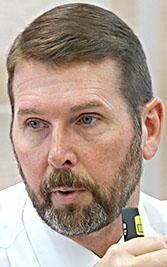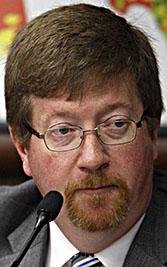State employees are getting pay increases in the new fiscal year for reasons ranging from performance to promotions.
The largest raises for more than 28,000 employees in state government agencies -- excluding public two- and four-year colleges -- are mostly because of promotions and Republican Attorney General Leslie Rutledge's attempt to make her office's salaries more competitive, state records show.
With a promotion from deputy solicitor general to solicitor general in the attorney general's office, Nicholas Bronni received the largest pay raise among these employees -- $23,833, boosting his annual salary to $140,000 this fiscal year, according to records obtained by the Arkansas Democrat-Gazette through the Arkansas Freedom of Information Act.
Christopher Racey's promotion from chief of fisheries at the Arkansas Game and Fish Commission to assistant deputy director bumped up his salary by $22,835 this fiscal year to $98,153, said commission spokesman Keith Stephens.
Racey and Bronni are the only two employees in state government who got raises of more than $20,000 in fiscal 2019, which started July 1. Twenty-one other employees received raises larger than $10,000.
Four department directors who are among the highest-paid state employees who don't work in higher education won't get pay raises this fiscal year.
They are Department of Human Services Director Cindy Gillespie, Education Commissioner Johnny Key, Department of Health Director Nate Smith and Economic Development Commission Executive Director Mike Preston.
Gillespie's annual salary is $282,800 a year, while Key's is $235,823, state records show. Smith's annual pay is $221,977.
Preston's state-paid portion of his salary is $149,862. Preston also is paid a private salary supplement of $30,138 a year by a private foundation that supports the commission, said Gov. Asa Hutchinson's spokesman J.R. Davis. Preston has been paid a bonus of more than $50,000 by the foundation for each of the past three years.
These four department heads received good performance evaluations, but "we don't need to increase the salary at this time," Davis said Friday.
[SEARCHABLE DATABASE: Pay for state employees making more than the average annual salary]
The rest of the Republican governor's department heads received 2 percent raises this fiscal year, state records show. Each received good performance evaluations, Davis said.
Scott Bennett, director of the Department of Transportation, received a $10,426 raise to $218,998 this fiscal year, according to department records. The 5 percent pay raise is based on the Highway Commission deciding during its June 6 meeting that Bennett's performance was satisfactory, said Department of Transportation spokesman Danny Straessle. Bennett works for the state Highway Commission rather than the governor.
The state's highest-paid employees largely work at public colleges and universities.
At the University of Arkansas for Medical Sciences, Thomas Morris, who previously was a neurosurgery resident physician making $60,919 a year, received the largest pay raise of $489,081 to $550,000 a year with his recent hiring as a neurosurgeon and assistant professor in the Department of Neurosurgery, said UAMS spokeswoman Leslie Taylor.
At the University of Arkansas, Fayetteville, the largest pay raise for this fiscal year is the $46,899 salary increase to $185,000 granted to Jason Norsworthy, a professor of crop, soil and environmental science, said UA spokesman Steve Voorhies. Norsworthy's raise is in recognition of his value and the competitive nature of higher education, Voorhies said.
At Arkansas State University in Jonesboro, the largest pay increase for this fiscal year is the $11,770 increase to $129,775 for economics and finance department chairman Patricia Robertson, said ASU System spokesman Jeff Hankins. He said the raise includes an equity and merit increase.
PERFORMANCE RAISES
The employees who are eligible for performance-based raises under the Hutchinson administration's new merit pay system work at state agencies other than colleges and universities, the Department of Transportation, Game and Fish Commission, and constitutional offices.
The average salary for about 26,500 employees on the state's computerized accounting system increased from $42,199 to $43,283 starting July 1.
About 24,500 of these employees were eligible for performance-based raises, said Department of Finance and Administration spokesman Scott Hardin. The system is the Arkansas Administrative Statewide Information System.
State employees received their first paychecks with these raises July 20 and received their next checks Friday, Hardin said. The raises are financed through accumulated salary and efficiency savings, if possible, and if an agency requires assistance, state general revenue through a "performance fund," he said.
Each agency was authorized to give performance-based raises totaling up to 2.8 percent of its total annual of base salaries in this fiscal year. The maximum-authorized raise to any person is 10 percent. The projected cost of the merit raises is $27.5 million, Hardin said.
Agencies were given the discretion to determine the range of their merit raises.
For example, the maximum merit raise was 6 percent at the state Department of Finance and Administration, 5.45 percent at the Department of Human Services, 5.25 percent at the Department of Correction, 5.1 percent at the Department of Health and 5 percent at the Department of Community Correction, Hardin said.
The highest performance rating identified an employee as a role model, while the second-highest rating said the worker was highly effective, the third-highest rating was for a solid performer, the fourth-highest rating was for an employee who "needs development," and the bottom rating was for unsatisfactory performance.
Hardin said 661 employees were deemed as role models and 2,087 were rated as highly effective.
The vast majority -- 18,726 employees -- were evaluated by their supervisors to be solid performers.
In the bottom two ratings, 2,683 were evaluated as "needs development" and 52 were judged to be unsatisfactory.
"In most cases, if the employee is rated unsatisfactory, it is likely a performance improvement plan has been or will be implemented, providing the employee three months to demonstrate improvement," Hardin said.
The merit raises are an ongoing salary increase and not a one-time bonus, Hardin said.
John Bridges, executive director of the 15,000-member Arkansas State Employees Association, said getting merit raises added into base salaries "is a huge success for state employees" and "that was our No. 1 goal.
"Now, they have an incentive to work hard and their salary is going to increase because of that," he said in an interview last week.
A few months ago, state Sen. Larry Teague, D-Nashville, questioned whether the beneficiaries of the performance pay system would be some administrators rather than rank-and-file employees.
Teague said last week that he doesn't have any problem with the merit raises, but he is asking more questions about their distribution.
"Maybe it may work," he said in an interview. "It will be interesting to see it how it works out."
Of the largest performance raises granted in terms of dollars:
• In the Department of Health, chief physician specialist Glen Baker's salary was raised $10,153 to $209,238 and chief physician specialist James Bledsoe was raised $8,844 to $182,260. Both are 5.1 percent raises. Bledsoe is the husband of state Sen. Cecile Bledsoe, R-Rogers, who chairs the Senate Public Health, Welfare and Labor Committee.
• In the Department of Human Services, raises of $7,325, or 5.45 percent, were granted to deputy directors Keesha Smith and Dawn Stehle. They now make $141,732 a year.
• In the Department of Finance and Administration, raises of $8,064, or 6 percent, went to deputy directors Carla Haugen, Paul Louthian and Walter Anger, who now make $142,470 a year. A $8,039 raise, or 5 percent, was given to lottery Gaming Director Michael Smith, who now makes $168,828 a year.
JOB PROMOTIONS
Many of the largest raises are linked to promotions.
At the Department of Health, Britni Lee and Christine Kresse each received a $15,699 pay raise to $56,039 a year. Lee was promoted to public health section chief from health program specialist, while Kresse was promoted from emergency medical services supervisor to a public health section chief, said Hardin.
At the Department of Human Services, Tami Harlan received a $14,165 raise, to $121,559. She was promoted from Division of Medical Services deputy director to interim director, said Amy Webb, department spokesman.
At that department, Carrie Jones received a $13,580 raise to $69,776. She was promoted from licensed certified social worker to area manager, Hardin said. Tamara Felix picked up a $12,309 raise to $62,531 as she was promoted from accounting coordinator to assistant controller, Hardin said.
At the Arkansas Geological Survey, Kerstein Dunn got a $14,906 raise to $37,266 as she moved from a part-time to full-time technician, Hardin said. At the Spinal Cord Commission, Tracy Deeds' salary increased by $13,017 to $26,034 as she was promoted from a part-time to a full-time administrative specialist, Hardin said.
At the Department of Workforce Services, Paul Farris received a $12,684 raise to $64,445 a year as he was promoted from software support specialist to information systems security specialist, Hardin said.
RUTLEDGE'S STAFF
Beyond Bronni, others in the attorney general's office received raises exceeding $10,000, according to state records.
They include Assistant Attorney General Nga Mahfouz's $19,100 raise to $110,000; Assistant Attorney General Shawn Johnson's $17,924 raise to $110,000; Deputy Attorney General William Jones' $15,000 raise to $115,000; Deputy Attorney General Brian Bowen's $15,000 raise to $115,000; Assistant Attorney General Holly Johnson's $12,122 raise to $110,000; Assistant Attorney General Cassandra Hudson's $11,020 raise to $110,000; and Assistant Attorney General Jennifer Merritt's $11,020 raise to $110,000.
Those getting $9,000-plus raises include Deputy Attorney General Kenneth Warford, a $9,910 raise to $120,000; Deputy Attorney General Monty Baugh, a $9,910 raise to $120,000; Deputy Attorney General Charles Harder, a $9,829 raise to $120,000; Chief Deputy Attorney General Julie Benafield's $9,159 raise to $135,000; Executive Assistant Dawnetta Calhoun, a $9,398 raise to $64,948; and Assistant Attorney Generals William Bird's and Gary Sullivan's $9,100 raises to $100,000 apiece.
Calhoun also is the attorney general's scheduler, so she performs duties once performed by two employees under then-Attorney General Dustin McDaniel, Rutledge spokesman Amanda Priest said.
When the Legislature in 2017 enacted the new state pay plan, Rutledge won approval to alter the maximum-authorized salaries in her office to be commensurate with those of other state employees, Priest said.
She said 154 employees in Rutledge's office received average raises of $3,400, and the increases totaled $526,999. The office includes 66 attorneys with average salaries of about $89,000, she said.
"Retaining the best and brightest attorneys to successfully defend the state against criminals, con artists and overreaching regulations requires the attorney general's office to ensure salaries are comparable to other states agencies," Priest said in a written statement. "Over the years, a number of attorneys have transferred from the attorney general's office to positions with other states agencies and received a significant salary increase."
Priest pointed out that the Chief of Staff Cory Cox is paid $140,760 a year and Chief Deputy Attorney General Julie Benafield is paid $135,000 a year. By comparison, Priest said, Bureau of Legislative Research Director Marty Garrity is paid $172,108 a year and bureau Assistant Director for Legal Services Matt Miller earns $155,916. Department of Human Services Chief Attorney Misty Bowen-Eubanks makes $125,665, and Chief Attorney David Sterling makes $124,038.
SundayMonday on 08/05/2018

